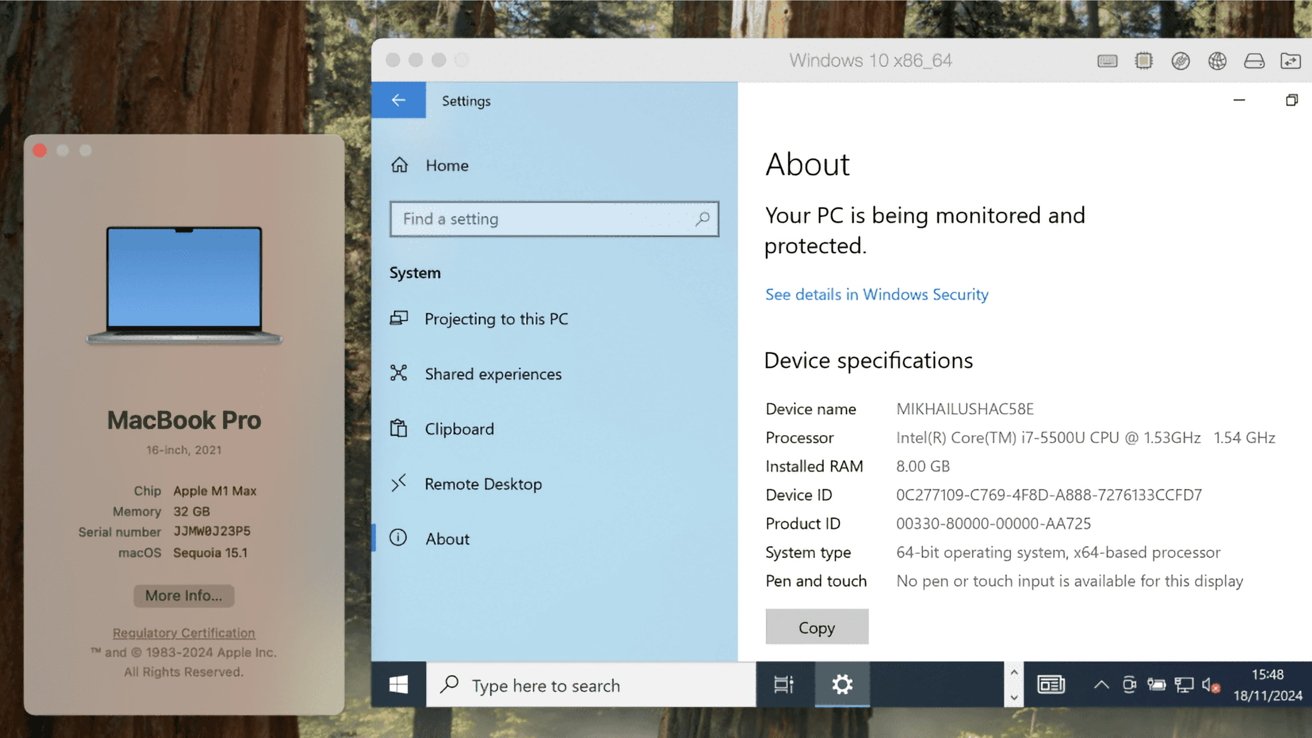Parallels Desktop 20.2 is out now, with the latest edition including 64-bit x86 emulation for Apple Silicon and more enhancements to make Apple Intelligence Writing Tools work with Windows apps.
January's update to the popular virtual machine tool Parallels Desktop brings the software up to version 20.2, just under three months after the update to version 20.1. The latest version adds a few more key changes to the virtualization tool.
The big addition is an early technology preview of x86 emulation for Apple Silicon Macs. Using a proprietary emulation engine, it allows Apple Silicon Macs to run x86_64 virtual machines, for Windows 10, Windows 11, and Linux.
While support for Apple Silicon has been around since Parallels Desktop 16.5, it has been limited in not having x86 emulation support until this update.
The new emulation in a tech preview provides a few benefits that were not available before. This includes being able to develop and test 32-bit Windows apps in a native environment.
For Linux users, this also gives an alternative to running Linux virtual machines through Rosetta.
The tech preview does have some limitations, according to a company blog post, including initial slow performance depending on the host hardware. Also, only 64-bit operations are supported, but 32-bit apps could still be run.
There's also no USB device support within those VMs. Lastly, Parallels Hypervisor can't be used, with the VMs needing to be booted via Apple's version.
Single Sign On
To help corporate customers, Parallels Desktop 20.2 also brings with it some deployment options.
There is SSO for IT teams, which allows admins to set up SSO or license key activation methods. They can also push configurations to managed Macs using the Parallels Management Portal.
License management is also streamlined thanks to the use of corporate identity providers, including Microsoft Entra ID and Okta.
For end users, this means they can activate using Single Sign-On by logging in with a corporate e-mail account.
More Apple Intelligence
In Parallels Desktop 20.1, there was support for Writing Tools, so users could use the Apple Intelligence features in Windows. This has been enhanced in version 20.2.
Under the update, users can now select Writing Tools (Mac) under a context menu in Microsoft Outlook, Microsoft Word, and Microsoft PowerPoint, simplifying access.
 Malcolm Owen
Malcolm Owen







-m.jpg)






 Christine McKee
Christine McKee

 Marko Zivkovic
Marko Zivkovic

 Andrew Orr
Andrew Orr
 Andrew O'Hara
Andrew O'Hara
 William Gallagher
William Gallagher





-m.jpg)



8 Comments
Wow, this is indeed great news - at least for me! Because x86 VMs weren't supported, I had to keep around my x86 MBP laptop so I could build our product for x86 Windows & Linux (and to run TurboTax for Business once a year - as that is only available as x86 Windows app). Now I can finally retire that Mac :-)
This is great news! Fingers crossed 32-bit is just around the corner to support XP to keep some old games alive.
I would love to see x86/x64 support. As someone who uses a 14" M4M MacBook Pro at work and also needs access to Active Directory I currently have to RDP into a Windows PC to access AD as Microsoft doesn't support RSAT Tools for ARM.
I have tried this on my M2 MBP with UTM: https://mac.getutm.app/. But it is painfully slow. Whether there are optimisations that have not been done or what I don't know. But for anything but using notepad it's too slow.
I bought my 2020 i9 iMac because I still need x86 compatibility. I’m hopeful that when I’m ready in a few years to retire my iMac that this problem will have been worked out. I don’t need near native speeds, just the ability to run a few apps that don’t have MacOS support.
exciting news!